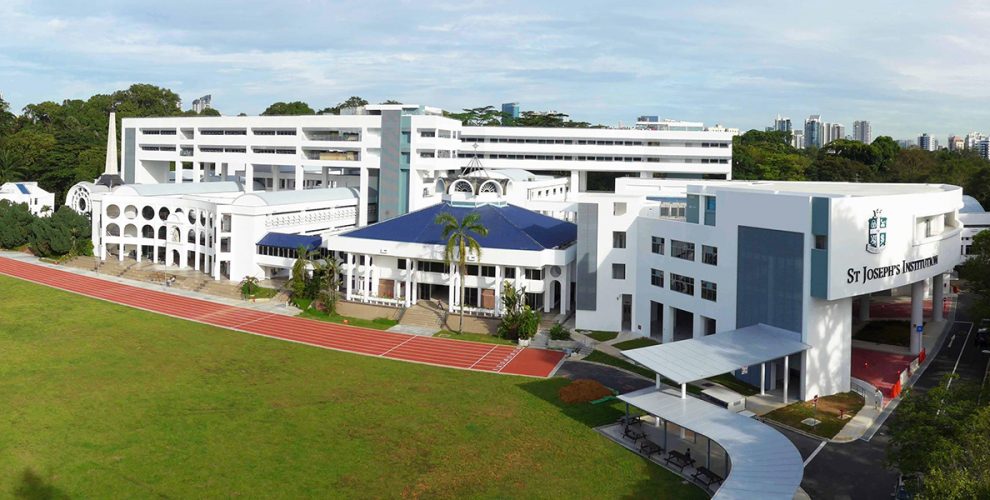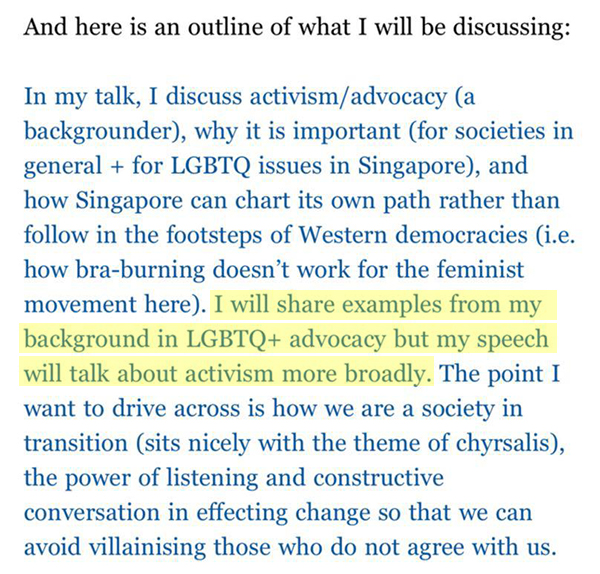LGBTQ+ Speaker Banned From Giving Talk
On 20 July 2018, LGBTQ+ activist Rachel Yeo, 23, was barred from giving a TED Talk at St Joseph’s Institution, a day before she was scheduled to speak.
The school had invited the NTU final year student, who is part of the Inter-University LGBT Network (Singapore), to be part of their TedxYouth@SJI talks.
Her talk would have covered activism and facilitated healthy discussion, by encouraging individuals to listen to those they disagree with instead of quickly dismissing contrary opinions. She was going to use her experience of LGBTQ+ advocacy as an example.
According to Rachel, the school informed her that she was “not permitted to speak due to MOE regulations that were beyond their control”. A second statement was later released, citing she was uninvited after “further deliberations on the relevance of the speakers” to the talk’s theme, ‘Chrysalis’.
In turn, MOE responded to digital newspaper TODAYonline’s query, stating “MOE was neither involved in nor informed about SJI’s deliberations on the TEDxYouth@SJI programme and selection of speakers. The school has full authority to make such decisions on its own.”
Despite her disappointment at the outcome, Rachel is “proud of the student organisers”. “The boys were inclusive and they were non-discriminating. They didn’t think, ‘Eee, don’t invite gay people’ or anything like that.”
“Coincidentally, the theme of Pink Dot this year is also ‘We Are Ready’. They were ready. It was clear the institution wasn’t.”
What the content was supposed to be
During her correspondence with the SJI student organisers, Rachel was told only to “avoid religion and framing any views as 100% wrong or 100% right”.
In accordance with the given guidelines, Rachel’s aim of the talk was to “share examples from (her) background in LGBTQ+ advocacy” but “talk about activism more broadly”.
“Most of my detractors assume I’m out to influence young straight people into being gay which is misconceived. The purpose of my talk was written in black and white in my correspondence with SJI; LGBTQ+ issues were not even the main focus.”
Rachel had also planned to share some practical tips for speaking with people who don’t stand on the same side.
“The audience who I would have been speaking to are aged 13-18, the age most start to develop strong opinions on things, and may want to start championing certain causes.”
Challenges of being an LGBTQ+ activist in Singapore
Still, this negative experience has not dampened Rachel’s want to advocate for LGBTQ+ causes.
At the past two Pink Dot events, Rachel mentions how she was heartened when “multiple university professors” and “numerous queer folk who used to attend NTU/SMU/NUS” showed their support for the varsity group’s booth.
“They come by and say ‘thank you for doing this’. They say they wish we existed back when they were in school so they would have felt less alone.”
This recognition that her work is meaningful keeps her going despite the challenges she faces as an activist. In her two years of LGBTQ+ activism, she has been on the receiving end of online vitriol.
And while she has not experienced any cases of direct harassment, she has been warned by a veteran local LGBTQ+ activist to make arrangements for her physical safety and to be prepared for harassment.
“Unlike people campaigning for less controversial rights, LGBTQ+ activists don’t often get a pat on the back. But you can’t let that get to you.”
“And as an activist and student, you get less sleep than most college students already do. But when I feel like I’m burning out, I take a step back, but I’ll keep going.”
Advocating For LGBTQ+ Rights In Singapore
Ultimately, Rachel feels Singapore is a society in transition and our society has “many things we never thought possible a decade or two ago, even on the LGBTQ+ front.”
“While we must keep fighting, we cannot be condescending or dismissive. Singapore can be better than that.”
Also read:
Cover image: Source








